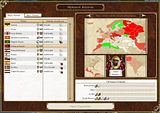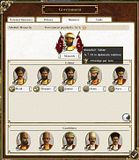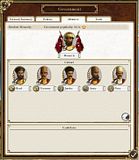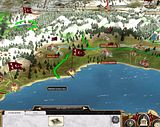The Ottoman campaign is the most interesting, challenging, and entertaining campaign I have played. Their lack of European technology and quality line units, particularly in the early game, creates a unique campaign experience.
There are several different strategies to be found in the forums for expanding the Ottoman Empire, and this article will outline my personal approach and preference of expanding westward. I feel it is much more important to hamstring as many of your potential rivals in Europe, in the early game, as possible. While it is much easier to expand eastward in the early game, the European nations develop more quickly than the Eastern nations; so in the late game, it is much harder to capture territory in Europe than the Middle East or India, due to the differences in military technology. In addition, control of the Mediterranean is invaluable in limiting your opponents’ trade and expanding your own trade empire.
Of course, one of the wonderful things about Empire: Total War is there is no “right move.” Each game plays out differently, and while there may be trends, early decisions by the AI and by you can have a dramatic impact on the direction the game takes.
You begin the game with most of the Greek Peninsula and control of the Mediterranean coast from Anatolia to Egypt, as well as Baghdad and Armenia. The Barbary States and the Crimean Khanate are your protectorates, and you have trade established with them, the Mughal Empire, Genoa, and Venice. You begin the game at war with Russia and, of course, the Pirates.

There are few words to describe your starting Ministers. One of the kinder descriptions would be dreadful. Your Sultan, Mustafa II, cannot be described as politely. You can only hope he dies young, but you are probably stuck with him for a while.

You can improve your Ministers tremendously, though. Switch your Justice Minister with your Head Minister; then switch your Navy Minister with your new Justice Minister. Now, move Abdurahman Edhem to Army Administration, move Giritli Hakim to Treasury Administration, and move Cenaze Yahudi to the Naval Administration. (Put the remaining two alternates into the Treasury Minister position before you move Giritli Hakim into that position to get them out of the queue.)

There, that’s better.
I usually drop taxes to the lowest level for the lower classes and the second lowest level for the nobility. It will only reduce your income by about 600 per turn, but it will benefit population growth and region wealth in the long run. You can, of course, raise taxes whenever necessary to fund your military.
Establish trade treaties with as many nations as you can, but you definitely want to establish trade with Great Britain. In my experience, Great Britain and Poland-Lithuania will accept trade treaties, and Prussia will accept a trade treaty if you throw in a little cash. You cannot establish trade with Sweden on the first turn, but you’ll want a trade agreement with them soon. They become a lucrative trade partner. If you can get Prussia to accept a trade of improved grenades and 1500 cash or less for plug bayonet, do it. If not, establish a trade treaty, wait a few turns for relations to improve, and try again.
You begin with two protectorates: the Crimean Khanate and the Barbary States. There are a lot of warmongers out there suggesting you cancel your alliance with both of these nations. I strongly disagree. Once you have assisted the Crimean Khanate in driving off the initial wave of Russian attacks, they become a valuable ally in checking Russian aggression in the early game. The Russian military build-up will eventually outpace the Crimean Khanate; so you’ll need to keep a small force near their capital to assist them when the time comes.
The Barbary States present more of a dilemma. Initially, you will not be able to make alliances with any European nations, because the Barbary States start the game at war with almost everyone; and no one will accept an alliance with you, as long as you are allied with an enemy of theirs. However, nations will eventually start making peace with the Barbary States. In the meantime, the Barbary States will hamper other nations’ Mediterranean trade without interfering with yours. In addition, like the Crimean Khanate, they provide reasonable trade income and pour half of their income into your coffers.
However, while I believe that the advantages of maintaining your alliances outweigh the benefits of canceling them, the choice is yours. Don’t forget, though, you receive a diplomacy penalty, if you choose to cancel an alliance.
If you are used to playing as European nations, you’re in for a big surprise. You will definitely need to change your tactics. Developing good strategies with skirmishers and artillery are essential. These two areas are where your early units excel. I will address only units you can recruit or immediately employ in Europe. Try to build a dockyard in Antalya, Anatolia as soon as possible. You do not have access to Sixth Rates, and you want to be able to build Fourth and Fifth Rates early.
Your starting line infantry, Isarelys, are relatively weak in comparison to European line infantry. Luckily, your first major opponent, Austria, has some of the weakest line infantry in Europe. However, the Austrian line infantry has more men in each unit. Do not write-off your Isarelys, though. They will continue to be a staple of your armies until you can begin producing Nizam-I-Cedit in the middle game. Until then, Isarelys are your only infantry units that can use bayonets or form square.

Azzars are your starting skirmisher unit. You will want to learn to use them well, because they will win battles for you in the early game. Their most valuable trait is that they can stay concealed while moving. Unfortunately, they are no better than Austria’s starting skirmishers, Pandours. Regardless, hit-and-run tactics and ambushes staged with these units can turn the tide of battle.
Musellims don’t look like much, but they are useful melee units, mostly because of their large unit sizes. They can be used to mob your opponents from the flanks, or to occupy your opponent while you move skirmishers or line infantry for flanking fire.
Semenys are cheap and are used almost exclusively to garrison ports.
Bashi-Bazouks are completely useless. They can stay concealed while moving; but since they are melee units, they have to expose themselves before they can do any damage. They break so quickly as to be a liability in battle. You can dismiss most of them at the beginning of the campaign.
Deli Horsemen can be extremely effective. Being able to deploy missile cavalry in the early game is indispensable. Try to move them to the flank or rear of an engaged enemy and launch a charge, during which they will discharge their weapons. They can also be used to hunt undefended artillery. Do not let them get bogged down in melee, though.
Did you get the Special Forces DLC? I hope so, because it gives you access to one of the most devastating artillery pieces in the game: The Ottoman Organ Gun. They are fairly expensive and require three turns to build, but they are impressive-looking. They are fixed cannon and can only fire round shot, but they are cavalry killers. A well-placed volley can wipe out almost an entire cavalry unit. While it is relatively inaccurate, each cannon fires about 12 cannonballs at once; so at least a few should find their mark. Regardless of physical impact, the impact on opponents’ morale is significant.

The 18-pounder Foot Artillery is your basic artillery unit, though heavier than the European starting guns. You begin the game with canister shot; so you should use these artillery pieces in your army from the beginning of the campaign, particularly for defense.
Your starting scholar, Meshur Dede, in Anatolia needs to be moved into the school. He has +2 research bonus for enlightenment technologies; so that is where you want to start. I recommend researching empiricism to gain early access to the college improvement, but any of the enlightenment techs is fine. You have many major cities and you will want to build up to Sultan's Observatories in as many as possible for the additional scholars. Your scholars cannot duel; so the additional manpower (brainpower?) is needed to complete your research quickly and spare a scholar for espionage.
At the beginning of the campaign I focus my building improvements on farms and roads. Each of these can provide a reasonable boost to region wealth with little investment. Farms have the additional bonus of positively influencing population growth. Roads have the additional bonus of reducing travel times through provinces where they have been built, and they cannot be damaged or destroyed.
I suggest immediately trading Armenia to the Persian Empire for trade rights and an alliance. (You can probably get some money out of this, as well. I usually shoot for about 1200.) The benefits of this trade are many: Persia will maintain their alliance with you, as long as you play nice; and if you do not establish an early alliance, they will declare war on you and prevent you from moving trade ships out of the Persian Gulf. The trade also immediately creates a buffer territory between you and Georgia, otherwise Georgia will declare war on you. You have effectively secured your Middle Eastern territories; so you can focus on expanding in Europe. You will also be able to immediately start building dhows in Basra to trade spices in the East Indies trade theater and trade ivory in the Madagascar trade theater. You can produce one dhow every other turn in the Persian Gulf, giving you the opportunity to secure the trade nodes in these theaters before other nations. (This will help develop your economy. You will need a lot of money to support your early military.) You will want to keep a small security force in Baghdad, until relations improve with Persia, to help them avoid any temptation to betray you. The force evicted from Armenia, along with those already garrisoning Baghdad should be enough.
Send a small force to defend the Crimean Khanate from the inevitable attack by the Russians. I usually send Damat Aali’s force (located in Moldavia), except for the General and Bashi-Bazouks. Those three units should be sufficient. You will only need to reinforce the Crimean military to ensure the Russians do not win their initial battles and capture the Crimea. (Only reinforce. There is no need to enter battle on your own against the Russians.) This will stall them for five to fifteen (5 – 15) turns, as they will soon be occupied with Sweden. You do not want the Russians to gain a port with access to the Mediterranean. In most of the games I’ve played, after you help the Crimean Khanate repel the initial attack or two from Russia, they will go on the offensive, sometimes capturing Kiev from the Russians.
Prepare for war in Europe, but do not declare war on anyone. Let whoever (Austria, I’m looking at you) be the aggressor. Within the first few turns, any combination of Austria, Russia, Poland-Lithuania, Venice and the Italian States may declare war on you. When Austria declares war, you want to capture Croatia and Transylvania. However, do not call your allies to help. (They would not be able to provide significant assistance, anyway; and you want to stay on the best possible terms with Great Britain and the United Provinces, both allies of Austria.) Your early goals, here, are to protect your northern border, protect the Crimea, and gain control of the entire Greek Peninsula.
Once Venice declares war on you or you see an opportunity to declare war on them without drawing another major power (Spain) into the war, you should capture Patras, Morea. It is also important to capture Hungary; so you can provide a continual military threat to Vienna, Austria. Hopefully, by this time, you have pacified Austria, or at least established secure northern borders.
You will need to assemble a strong army for your next major goal – the subjugation of Italy. Of course, you cannot avoid war with Spain, once you start capturing Italy, but you want to delay that as long as possible. Italy, once secured, is easily defensible. There are few entry points to Italy. You can place forts in the mountain passes, and leave a garrison in the port at Nice. Italy can be used as a staging point for raids into Vienna, Austria or to capture that territory. In addition, Italy is extremely wealthy.

Morocco will probably declare war on the Barbary States fairly early in the campaign. If you want to keep the Barbary States as your protectorate, you’ll need to enter the war on their side. Morocco is a required territory for victory in the long campaign; so whenever you are able to spare enough resources you should land an army in North Africa and capture Morocco. This also provides a good staging point to invade Spain, which is another requirement for victory in the long campaign.
It is important to build up your navy early. Start building Fourth and Fifth Rates as soon as you get your dockyard completed in Anatolia. I usually turn the dock that becomes available in Crete into a military producer, as well; so you can have two ports producing warships. It also helps to devote a scholar (or two) with no particular skills to espionage, and I use one almost exclusively to steal naval technologies. Use this navy to dominate the Mediterranean. Try not to allow any nation you do not call “ally” to sail into the Mediterranean. Once you’ve captured all of Italy, France and Spain should be the only nations besides you and your allies to have a port in the Mediterranean. Station a sizeable warfleet in the Straits of Gibraltar and nothing should get through.
If you purchased the Elite Units of the East DLC, you want to follow the Military Governor’s Encampment/Barracks track in Sofia, Bulgaria and Sarajevo, Bosnia. In Bulgaria, this will give you access to Wallachian Boyars, the best light cavalry unit you can produce. They have the same statistics as Mamelukes, though the Boyars have a higher morale and are less expensive to maintain or recruit. In Bosnia, the military track grants you access to Bosnian Panduks and Haydut Irregulars. These are both excellent skirmisher units (and you can recruit them with just the Military Governor’s Encampment; so they are available fairly early). The Haydut Irregulars have higher accuracy, but the Bosnian Panduks have a higher melee rating. Though the Panduks can stand up longer in melee, you should not allow these units engage in melee anyway; so I prefer the higher accuracy of the Haydut Irregulars.
Once you have built a city to the level that it can produce both Beylik Janissary Musketeers and Hand Mortar Boluks, you can employ the
Once you have secured Greece and Italy and locked down the Mediterranean, you can expand wherever you want. I prefer to expand into India, rather than the Americas, because India is easier to reinforce from the Middle East. Once you have established good relations with Persia, you should be able to make a deal with them for indefinite military access. (I have generally been able to offer them 20 turns military access for indefinite military access to their lands and have them accept the trade.) You can then reinforce India by land, as well as through the Persian Gulf. You can also raid India from Persian territory and retreat safely back to their territory.
A note on trade ships: Dhows are very weak, but when used creatively, they can stand up to larger ships. A single dhow can take on a single galleon or other large, slow ship. Dhows have two guns facing aft (toward the rear of the ship); so you can maneuver the dhow to be racing away from the large ship and keep adjusting your course to keep your enemy in your cone of fire. As long as you stay right on the edge of your range, the opposing ship will not be able to turn a broadside towards you until you are out of their range. While dhows only carry three total guns, they are heavy guns; so you can eventually sink your opponent or force them to retreat. It is dull, and it takes a lot of micromanagement, but it works. If you are attacked by multiple ships, a sloop, a fifth rate, or a sixth rate, you should just retreat.
Try to ally with Great Britain and the United Provinces, since you spend most of your time at war with their natural enemies, France and Spain. It also helps to keep Austria in check, as they are less likely to go to war with allies of their allies, but they will. Take Greece, Italy, North Africa, and India or the Americas. Dominate the trade theaters and the Mediterranean and you will be well on your way to bringing glory to the Ottoman Empire and making it the greatest power in the world.

Wasting time is merely an occupation then, and a most exhausting one. Idleness, like kisses, to be sweet must be stolen." -- Jerome K. Jerome
"Some people become so expert at reading between the lines they don't read the lines." -- Margaret Millar
ERADICATE CONDESCENSION! (That means don't talk down to people.)
[This message has been edited by BastWorshiper (edited 12-19-2010 @ 10:12 AM).]
